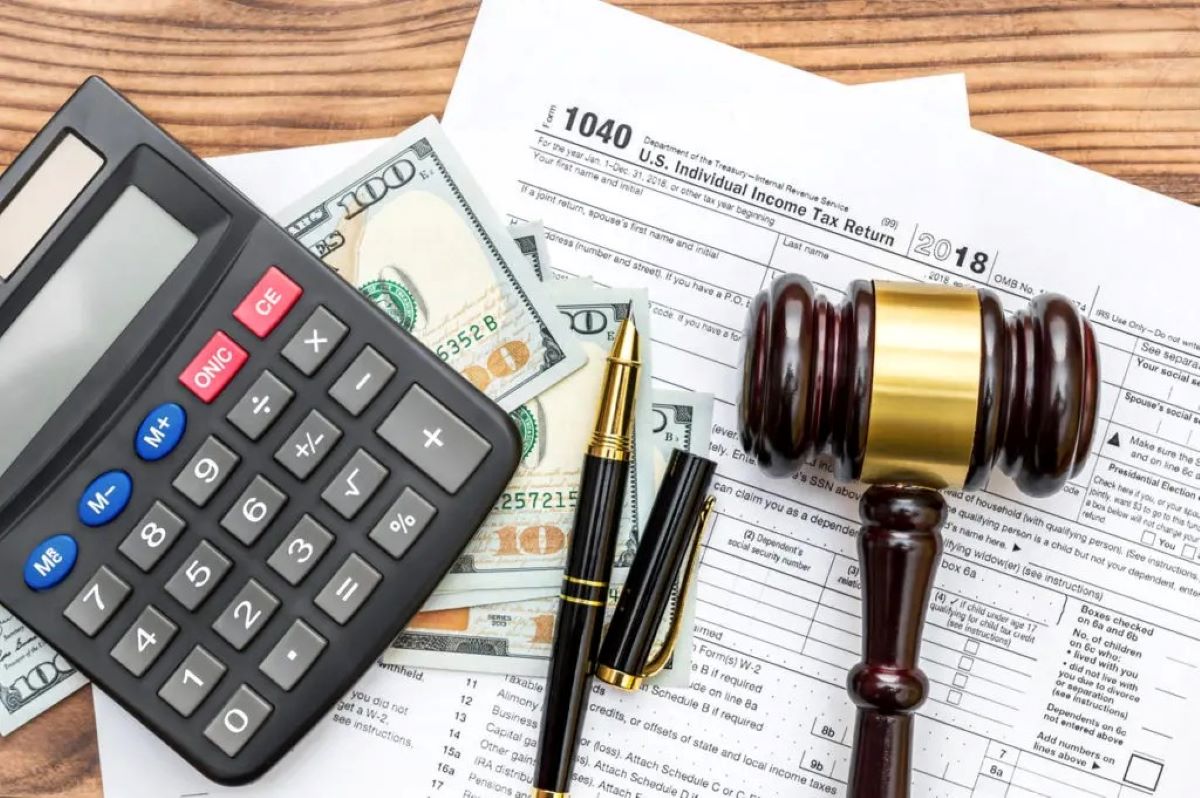

Finance
How To Sue The IRS
Published: October 31, 2023
Learn how to sue the IRS and protect your finances. Get expert advice on navigating legal processes and maximizing your chances of a successful lawsuit.
(Many of the links in this article redirect to a specific reviewed product. Your purchase of these products through affiliate links helps to generate commission for LiveWell, at no extra cost. Learn more)
Table of Contents
- Introduction
- Understanding the Legal Basis for Suing the IRS
- Requirements for Suing the IRS
- Gathering Evidence and Documentation
- Filing a Lawsuit Against the IRS
- Working with Legal Professionals
- Preparing for the Lawsuit
- Presenting Your Case in Court
- Possible Outcomes and Remedies
- Post-Lawsuit Considerations
- Conclusion
Introduction
Dealing with the Internal Revenue Service (IRS) can be a daunting task, especially when you face unresolved issues or disputes regarding your taxes. In some cases, you may find yourself in a situation where you believe you have been mistreated or subjected to unfair practices by the IRS. In such circumstances, you might consider taking legal action and suing the IRS to seek resolution and justice.
Suing the IRS is not a decision to be taken lightly, as it involves navigating through complex legal processes and requirements. However, if you are confident that you have a valid case and the necessary evidence to support your claims, pursuing a lawsuit against the IRS may be your best course of action.
In this article, we will provide a comprehensive guide on how to sue the IRS. We will discuss the legal basis for suing the IRS, the requirements you need to meet, and the steps involved in filing a lawsuit. Additionally, we will explore the importance of gathering evidence and documentation, working with legal professionals, and preparing for the lawsuit. Lastly, we will touch upon the possible outcomes and remedies, as well as post-lawsuit considerations.
It is important to note that suing the IRS is a serious matter that requires careful consideration and proper legal guidance. This article aims to provide you with the necessary information and insights to help you understand the process involved, but it is always recommended to consult with a qualified tax attorney or legal professional who specializes in tax litigation before proceeding with any legal action against the IRS.
Now, let’s delve into the details of how you can potentially sue the IRS and seek redress for any grievances you have faced.
Understanding the Legal Basis for Suing the IRS
Suing the IRS is not a decision that can be made without a solid legal foundation. To have grounds for a lawsuit, you need to understand the legal basis on which you can challenge the IRS. There are several common scenarios where individuals or entities have successfully sued the IRS:
- Abuse of Power: If you believe that the IRS has misused its authority or engaged in abusive practices, you may have a basis for a lawsuit. This could include cases of harassment, discrimination, or retaliation by IRS officials.
- Violation of Constitutional Rights: The IRS is bound by the United States Constitution, and any violation of your constitutional rights by the IRS could be grounds for a lawsuit. This could involve issues of due process, equal protection, or freedom of speech.
- Improper Collection Actions: If the IRS has engaged in unfair or illegal collection actions, such as seizing property or bank accounts without proper justification, you may be able to sue for damages or to prevent further collection efforts.
- Incorrect Tax Assessments: If you can demonstrate that the IRS has made incorrect tax assessments, leading to financial harm or undue burden, you may have a valid claim for a lawsuit.
- Breach of Confidentiality: The IRS is required to protect the confidentiality of your tax information. If you can prove that the IRS has unlawfully disclosed your information, resulting in harm or damages, you may have grounds for a lawsuit.
It is crucial to consult with a tax attorney or legal professional who specializes in tax litigation to evaluate the merits of your potential case. They can help you determine if your situation aligns with any of these legal grounds for suing the IRS and guide you through the complex legal process.
Remember that successfully suing the IRS requires solid evidence and a strong legal argument. It is essential to gather all relevant documents, communication records, receipts, and any other evidence that supports your claims. This evidence will play a pivotal role in building your case and increasing your chances of success.
In the next section, we will explore the specific requirements and steps involved in suing the IRS. Understanding these requirements is crucial to ensure you are prepared and have a clear plan of action before proceeding with a lawsuit against the IRS.
Requirements for Suing the IRS
Before proceeding with a lawsuit against the IRS, it is important to understand the specific requirements that must be met. These requirements are in place to ensure that the legal process is followed appropriately and that you have a valid case. Here are some key requirements to consider:
- Exhaustion of Administrative Remedies: In most cases, you must exhaust all available administrative remedies before filing a lawsuit. This typically involves going through the IRS’s internal appeals process to try to resolve the issue. By demonstrating that you have attempted to resolve the matter administratively but have not found a satisfactory outcome, you strengthen your case.
- Statute of Limitations: Like any legal action, suing the IRS has a time limit. The statute of limitations for tax-related lawsuits can vary depending on the specific circumstances. It is important to consult with a tax attorney to determine the applicable statute of limitations for your case to ensure you file within the required timeframe.
- Establishing Standing: You need to establish that you have legal standing to sue the IRS. This means demonstrating a personal or financial interest in the matter at hand. In some cases, this may involve proving that you have suffered harm or damages as a result of the IRS’s actions or policies.
- Proper Venue: Lawsuits against the IRS must be filed in the appropriate venue. This typically means filing in the United States Tax Court or a federal district court. The venue will depend on the specific nature of your case and the relief you are seeking.
- Timeliness: It is crucial to file your lawsuit within the required timeframe. Failing to meet the deadlines set by the court can result in the dismissal of your case. Be mindful of the specific deadlines and ensure that you take appropriate legal action within the prescribed time limits.
- Sufficiency of Claim: Your claim must be legally sufficient and supported by relevant evidence. It is essential to articulate your case clearly, outlining the specific legal violations or harm caused by the IRS. Working with a qualified tax attorney can help ensure that your claim meets the necessary legal standards.
Meeting these requirements is essential for a successful lawsuit against the IRS. It is highly recommended to seek the guidance and expertise of a tax attorney who specializes in tax litigation. They can assess the viability of your case, help you navigate the legal requirements, and ensure that all necessary documentation and evidence are properly prepared.
In the next section, we will explore the process of gathering evidence and documentation to support your case. This step is crucial for building a strong argument in your lawsuit against the IRS.
Gathering Evidence and Documentation
When pursuing a lawsuit against the IRS, one of the most crucial steps is gathering strong evidence and documentation to support your claims. The evidence you gather will play a significant role in building a compelling case and increasing your chances of success. Here are some essential steps to help you gather the necessary evidence:
- Organize Your Tax Records: Start by organizing your tax records and any relevant documents. This includes tax returns, notices from the IRS, correspondence, receipts, and any other records related to the issues you are disputing. Proper organization will make it easier to identify and present the evidence effectively.
- Request Documents from the IRS: If you need additional documents or information from the IRS to support your case, you can make a request through the Freedom of Information Act (FOIA) or by submitting a formal request directly to the IRS. This can include copies of your tax returns, audit files, or other relevant documents held by the IRS.
- Collect Witness Testimony: If you have witnesses who can provide testimony or firsthand accounts of the IRS’s actions or the impact it had on you, it is important to gather their statements. This can add credibility to your case and strengthen your argument.
- Maintain a Record of Communications: Keep a detailed record of any communications with the IRS, including phone calls, emails, letters, or in-person meetings. Note down the dates, times, names of individuals you spoke with, and the content of your discussions. This documentation can be crucial in demonstrating the IRS’s actions or responses.
- Obtain Expert Opinions: In some cases, you may need to seek expert opinions to support your claims. This could involve obtaining a professional assessment of your tax situation, a financial analysis, or an opinion from a tax expert. Expert opinions can lend credibility to your case and provide specialized insights.
- Keep Detailed Financial Records: Maintain accurate and comprehensive financial records related to the issues you are disputing. This includes bank statements, invoices, receipts, and any other financial documentation that supports your claims or presents a clear picture of your financial situation.
Remember, the quality and comprehensiveness of your evidence can greatly impact the outcome of your lawsuit against the IRS. It is crucial to be thorough in your documentation and ensure that you have evidence to substantiate your claims. Consulting with a tax attorney or legal professional specializing in tax litigation can help you identify the most relevant evidence and ensure its adequacy for your case.
In the next section, we will discuss the process of filing a lawsuit against the IRS and the specific steps involved in initiating legal action.
Filing a Lawsuit Against the IRS
If you have gathered the necessary evidence and documentation and have determined that suing the IRS is the appropriate course of action, the next step is to file a lawsuit. Filing a lawsuit against the IRS involves specific procedures and requirements that must be followed. Here are the key steps to consider when filing a lawsuit against the IRS:
- Choose the Correct Court: Determine the appropriate court in which to file your lawsuit. This will depend on various factors, such as the nature of your case, the relief sought, and whether you are challenging a specific IRS action or policy. Common options include the United States Tax Court and federal district courts.
- Draft and File Your Complaint: Prepare a complaint that outlines your case, including the legal basis for the lawsuit, the facts of the case, and the relief you are seeking. The complaint should be filed with the appropriate court within the specified time limits and according to their procedural rules.
- Serve the IRS: After filing the complaint, you must serve a copy of the complaint and summons to the IRS. Proper service ensures that the IRS is officially notified of the lawsuit and has an opportunity to respond.
- IRS Response and the Discovery Process: The IRS will have the opportunity to respond to your complaint through a formal answer or other legal filings. Following this, both parties will enter into the discovery process, during which evidence is exchanged, depositions may be taken, and interrogatories may be answered, with the goal of gathering more information relevant to the case.
- Mediation and Settlement Discussions: As the lawsuit progresses, there may be opportunities for mediation or settlement discussions. These alternate dispute resolution methods can help resolve the case without going to trial. It is important to consider potential settlement options, weighing the benefits and risks involved.
- Pretrial Procedures and Motions: Before the trial date, pretrial procedures and motions may be filed by both parties. This can include motions to dismiss, motions for summary judgment, or motions to exclude evidence. These procedural steps help streamline the case and determine the issues that will be presented at trial.
- Trial: If a resolution is not reached through mediation or settlement, the case will proceed to trial. Both parties will present their arguments, witness testimony, and evidence to the judge or jury. It is crucial to be well-prepared, organized, and represented by a skilled tax attorney who can effectively present your case.
- Post-Trial Motions and Appeals: Following the trial, post-trial motions may be filed by either party. If a party is dissatisfied with the outcome of the trial, they may also have the option to appeal the decision to a higher court, depending on the circumstances and applicable laws.
Successfully filing a lawsuit against the IRS requires a clear understanding of the rules and procedures involved. Working with a tax attorney who specializes in tax litigation is highly recommended, as they can guide you through each step of the process, ensuring that your lawsuit is filed correctly and efficiently.
In the next section, we will discuss the importance of working with legal professionals and the role they play in your lawsuit against the IRS.
Working with Legal Professionals
Suing the IRS is a complex legal process that requires a thorough understanding of tax laws and litigation procedures. To navigate this process successfully and improve your chances of a favorable outcome, it is crucial to work with legal professionals who specialize in tax litigation. Here are some reasons why collaborating with legal professionals is essential:
- Expertise and Specialization: Tax attorneys who specialize in tax litigation have in-depth knowledge of tax laws, IRS procedures, and the intricacies of suing the IRS. They understand the specific legal requirements, strategies, and arguments that can be used to build a strong case in your favor.
- Case Evaluation: Legal professionals can evaluate the merits of your potential case and provide an honest assessment of your chances of success. They can analyze the evidence, determine the legal grounds for your lawsuit, and advise you on the best course of action to take.
- Legal Guidance and Strategy: Attorneys can guide you through the entire process, from gathering evidence to filing the lawsuit, and representing you in court. They can develop a comprehensive legal strategy tailored to your specific circumstances and ensure that all necessary legal requirements are met.
- Representation and Advocacy: Legal professionals will act as your advocates, representing your interests and presenting your case in the most persuasive manner. They can effectively communicate with the IRS, negotiate settlement discussions, and present your arguments before a judge or jury.
- Procedural Compliance: Tax litigation involves intricate procedural rules and strict deadlines. Legal professionals will ensure that all necessary documents are properly drafted, filed, and served in a timely manner, avoiding potential pitfalls that could harm your case.
- Experience Handling IRS Cases: Attorneys who specialize in tax litigation have experience dealing with the IRS and understand its internal processes and practices. They can anticipate the IRS’s strategies, effectively counter their arguments, and leverage their experience to your advantage.
Choosing the right legal professional is crucial for a successful lawsuit against the IRS. Look for attorneys who have extensive experience in tax litigation, a track record of successful outcomes, and a deep understanding of tax laws. It is also important to ensure that you have good communication and rapport with your attorney, as you will be working closely together throughout the process.
While legal representation can be costly, it is an investment in your case. The expertise and guidance of legal professionals can significantly increase your chances of achieving a favorable outcome and resolving your issues with the IRS effectively.
In the next section, we will discuss the important considerations and steps involved in preparing for a lawsuit against the IRS.
Preparing for the Lawsuit
Preparing for a lawsuit against the IRS requires careful planning and attention to detail. Taking the time to adequately prepare can strengthen your case and increase your chances of success. Here are some important considerations and steps to take when preparing for a lawsuit against the IRS:
- Evaluate Your Case: Review your evidence and consult with your tax attorney to evaluate the strength of your case. Assess the legal grounds, the strength of your evidence, and the possible defenses the IRS may present.
- Develop a Legal Strategy: Work with your attorney to develop a comprehensive legal strategy. Determine the key arguments and legal theories that will form the foundation of your case.
- Clarify Your Objectives: Clearly define your objectives for the lawsuit. Understand what specific outcome you are seeking and what relief you are asking the court to provide.
- Identify Expert Witnesses: If necessary, identify and consult with expert witnesses who can provide specialized knowledge or opinions supporting your case. These experts can help strengthen your arguments and provide credibility to your claims.
- Prepare for Discovery: Anticipate the discovery process by organizing and reviewing your documents, determining which documents will be relevant to the case, and being prepared to respond to any requests for information from the IRS.
- Explore Settlement Options: Consider the possibility of a settlement with the IRS. Engage in settlement discussions and evaluate the potential benefits and risks of reaching a resolution without going to trial.
- Anticipate the IRS’s Defense: Work with your attorney to anticipate and prepare for the arguments and defenses that the IRS may present. Develop counterarguments and gather evidence to refute their claims.
- Consider Potential Witnesses: Identify any potential witnesses who can testify on your behalf. Prepare them to provide accurate and compelling testimony that supports your case.
- Review Court Procedures: Familiarize yourself with the court procedures, rules, and deadlines that will apply to your case. Ensure that you understand the requirements and comply with all necessary filings and submissions.
- Maintain Communication with Your Attorney: Stay in close contact with your tax attorney throughout the preparation process. Keep them informed of any new developments or information that may impact your case.
By thoroughly preparing for your lawsuit against the IRS, you can present a strong and persuasive case. Working closely with your tax attorney ensures that you are well-prepared for each step of the legal process and increases your chances of achieving a favorable outcome.
In the next section, we will discuss the importance of presenting your case effectively in court and the considerations for doing so.
Presenting Your Case in Court
Presenting your case effectively in court is crucial to achieving a favorable outcome in your lawsuit against the IRS. It requires careful preparation and the ability to articulate your arguments convincingly. Here are some key considerations for presenting your case in court:
- Prepare Your Opening Statement: Craft a compelling and concise opening statement that outlines the key points of your case. Use this opportunity to establish your position, introduce your arguments, and engage the judge or jury from the outset.
- Organize Your Evidence: Arrange your evidence in a logical and coherent manner. Present it in a way that is easy for the judge or jury to follow and understand. Use exhibits, visuals, or demonstrative aids if appropriate to enhance clarity and impact.
- Present Witnesses Effectively: Prepare your witnesses to testify confidently and clearly. Anticipate the questions that will be asked by opposing counsel and ensure that your witnesses are fully prepared to provide honest and accurate testimony that supports your case.
- Adhere to Court Procedures and Etiquette: Familiarize yourself with the court’s procedures, rules, and etiquette. Dress appropriately, address the judge respectfully, and follow any instructions given during the proceedings. Show professionalism and respect to enhance your credibility.
- Stay Focused and Calm: Remain composed and focused throughout the court process. Present your arguments with confidence and clarity. Control your emotions, as emotional outbursts or an overly aggressive demeanor can negatively impact your case.
- Respond to Cross-Examination: Anticipate and prepare for cross-examination by opposing counsel. Stay calm, listen carefully to the questions, and provide concise and truthful answers. Do not argue with the opposing counsel or become confrontational.
- Highlight Key Arguments and Evidence: Emphasize the strongest points of your case and highlight the evidence that supports your claims. Make sure that the judge or jury is aware of the most compelling pieces of evidence and understands their relevance to the issues at hand.
- Deliver a Convincing Closing Argument: Make a persuasive closing argument that summarizes the key points of your case and reinforces why the court should rule in your favor. Reiterate the main arguments, address any counterarguments raised by the opposing party, and leave a lasting impression on the judge or jury.
- Respect the Court’s Decision: Regardless of the outcome, respect the court’s decision and maintain professionalism. If dissatisfied, consult with your attorney to explore whether an appeal may be appropriate.
Presenting your case effectively requires careful planning, preparation, and the support of a knowledgeable tax attorney. Ensure that you work closely with your attorney throughout the process, as their expertise and guidance can significantly enhance your ability to present a strong and persuasive case in court.
In the next section, we will discuss the possible outcomes and remedies that can arise from a lawsuit against the IRS.
Possible Outcomes and Remedies
When pursuing a lawsuit against the IRS, it is important to understand the potential outcomes and remedies that may arise from the legal proceedings. While each case is unique and dependent on specific circumstances, here are some possible outcomes and remedies that can result from a lawsuit against the IRS:
- Judgment in Your Favor: The court may rule in your favor, affirming your claims against the IRS. This outcome can result in various remedies, such as financial compensation, the reversal of an IRS decision, or the rectification of a legal violation.
- Settlement: It is possible to reach a settlement with the IRS at any stage of the lawsuit. A settlement can allow you to resolve the issues without going through a full trial, potentially resulting in a mutually agreed-upon resolution that addresses your concerns.
- Affirmation of IRS Actions: The court may affirm the actions or decisions of the IRS, ruling against your claims. If this occurs, you may have the option to appeal the decision or explore other legal avenues to challenge the ruling.
- Clarification of Legal Matters: Even if the court does not rule entirely in your favor, the lawsuit can still provide clarity on certain legal matters or raise awareness of potential issues with IRS procedures or policies. This can benefit other individuals or entities facing similar situations in the future.
- Repayment Plans or Relief: In cases involving tax liabilities or improper collection actions, the court may order the IRS to establish repayment plans or provide relief measures, such as reduced penalties or adjusted payment schedules. These remedies can help alleviate the financial burden or provide a more manageable path forward.
- Attorney’s Fees and Costs: In some cases, the court may award attorney’s fees and costs to the prevailing party. This can help offset the expenses incurred during the lawsuit and provide some financial relief.
It is essential to consult with your tax attorney regarding the potential outcomes and remedies specific to your case. They will help you understand the implications of each possible outcome and guide you through the appropriate actions to take based on the court’s decision.
Remember that the outcome of a lawsuit against the IRS can be influenced by numerous factors, including the strength of your evidence, the legal arguments presented, and the judge’s interpretation of the law. Working closely with your tax attorney can help ensure that you are prepared to pursue the most favorable outcome possible for your case.
In the final section, we will discuss important considerations and post-lawsuit aspects that you should keep in mind.
Post-Lawsuit Considerations
Once a lawsuit against the IRS has been resolved, whether through a judgment, settlement, or dismissal, there are several important considerations to keep in mind. These post-lawsuit considerations can play a significant role in your overall experience and future dealings with the IRS. Here are some key points to consider:
- Compliance with Court Orders: Ensure that you comply with any court orders or judgments resulting from the lawsuit. Failure to comply can have legal consequences and may negatively impact your relationship with the court and the IRS.
- Payment Obligations: If any financial obligations arise from the lawsuit, such as a judgment for payment or a settlement agreement, be diligent in fulfilling these obligations. Adhering to the payment terms will help avoid further legal actions or penalties.
- Maintain Communication with the IRS: After the lawsuit, it is essential to establish and maintain open lines of communication with the IRS. If there are ongoing tax matters or compliance issues, proactive communication can help prevent future disputes or misunderstandings.
- Continue Working with Your Tax Attorney: Even after the lawsuit, it is beneficial to maintain a relationship with your tax attorney. They can provide ongoing guidance, help address any remaining legal or tax issues, and assist you in navigating future interactions with the IRS.
- Evaluate Lessons Learned: Take the time to reflect on the experience. Assess what worked well and what didn’t during the lawsuit. Learn from the process and identify ways to improve your tax compliance strategies, record-keeping practices, and dealings with the IRS in the future.
- Monitor Potential Changes: Stay informed about any changes in tax laws, IRS regulations, or policies that may impact your tax situation. Remaining aware of these changes ensures that you can adapt your tax planning and compliance efforts accordingly.
- Seek Professional Advice: Consider seeking professional advice from your tax attorney or a tax professional to ensure ongoing compliance with tax laws and regulations. They can provide guidance on tax planning, IRS audits, or any potential issues that may arise in the future.
By addressing these post-lawsuit considerations, you can help maintain a positive relationship with the IRS and ensure continued compliance with tax laws. Additionally, the experience gained from the lawsuit can contribute to your overall understanding of the tax system and help you navigate future interactions with the IRS more effectively.
Remember that every tax situation is unique, and it is important to consult with your tax attorney or a qualified tax professional to tailor the post-lawsuit considerations to your specific circumstances.
Now that you have a comprehensive understanding of the process of suing the IRS and the associated considerations, you can proceed with greater confidence if you decide to pursue legal action against the IRS.
If you have any additional questions or concerns regarding your specific case, it is advisable to consult with a tax attorney who specializes in tax litigation.
Conclusion
Suing the IRS is a complex and challenging process that requires careful consideration, preparation, and expert legal guidance. By understanding the legal basis for suing the IRS, meeting the necessary requirements, and gathering strong evidence, you can build a solid foundation for your case. Working closely with a tax attorney who specializes in tax litigation is crucial to navigating the intricate legal procedures and presenting your case effectively in court.
Throughout this article, we have discussed the various aspects involved in suing the IRS, from understanding the legal grounds to filing a lawsuit, gathering evidence, and presenting your case in court. We have also examined the possible outcomes and post-lawsuit considerations that are important to keep in mind.
It is important to remember that every case against the IRS is unique, and the information provided in this article serves as a general guide. Consulting with a qualified tax attorney is the best course of action to assess the merits of your case, determine the best strategy, and navigate the intricacies of the legal process.
Suing the IRS is a significant undertaking, and it is crucial to carefully evaluate the benefits, risks, and potential outcomes before proceeding. It requires patience, persistence, and a deep understanding of tax laws and litigation procedures.
While pursuing legal action against the IRS can be an arduous journey, it can also provide an opportunity to seek resolution, justice, and fair treatment. With the right legal support, evidence, and preparation, you can take steps towards resolving your tax disputes and protecting your rights.
Remember, the information provided in this article is for educational purposes and is not legal advice. Always consult with a qualified tax attorney or legal professional who specializes in tax litigation to ensure that your specific case is handled properly and in accordance with applicable laws.
With the proper legal guidance and a clear understanding of the process, you can navigate the challenges of suing the IRS with confidence and work towards a favorable resolution to your tax issues.














